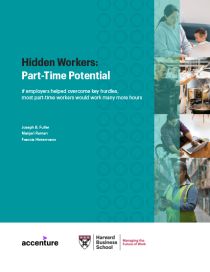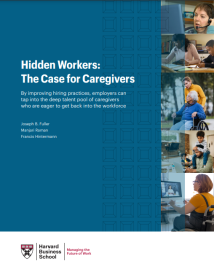Research
Research
By: Joseph B. Fuller, Manjari Raman, Eva Sage-Gavin, & Kristen Hines
Increased reliance on technology and changing demographics have shaped the way that companies hire. Hiring processes are designed to find “perfect” candidates in an efficient manner, but in doing so systematically exclude several categories of qualified workers, including caregivers, veterans, the formerly incarcerated, those with disabilities, etc. These workers are “hidden” by traditional hiring processes. Companies who have hired one or more of these groups of hidden workers report that these workers are more loyal and perform better on several key metrics compared to traditional sources of talent. With many companies facing a talent shortage, hiring these hidden workers may be the solution.
Related Report
Featured Articles

Companies Need More Workers. Why Do They Reject Millions of Résumés?
By: Kathryn Dill
By: Kathryn Dill
- 4 SEP 2021
- |
- The Wall Street Journal
Automated-hiring systems are excluding many people from job discussions at a time
when additional employees are desperately needed.
Automated-hiring systems are excluding many people from job discussions at a time
when additional employees are desperately needed.

How Businesses Can Find “Hidden Workers”
By: Joseph Fuller, Manjari Raman, Eva Sage-Gavin, & Ladan Davarzani
By: Joseph Fuller, Manjari Raman, Eva Sage-Gavin, & Ladan Davarzani
- 24 DEC 2020
- |
- Harvard Business Review
Even before the Covid-19 pandemic, low- and middle-skill workers struggled to find
and retain steady work. Now, many of these workers are considered "essential," while
many others are unemployed and struggling to find work. As the pandemic eases throughout
2021, companies will be looking to hire, and these workers are ready and willing.
But there are several, persistent barriers in the way, including caregiving responsibilities
and a lack of official credentials. So, in order to capitalize on their strengths
and talents, leaders need to understand what's preventing them from hiring "hidden
workers" in the first place and how to better reach them.
Even before the Covid-19 pandemic, low- and middle-skill workers struggled to find
and retain steady work. Now, many of these workers are considered "essential," while
many others are unemployed and struggling to find work. As the pandemic eases throughout
2021, companies will be looking to hire, and these workers are ready and willing.
But there are several, persistent barriers in the way, including caregiving responsibilities
and a lack of official credentials. So, in order to capitalize on their strengths
and talents, leaders need to understand what's preventing them from hiring "hidden
workers" in the first place and how to better reach them.

Fireside Chat - Human Capital: Future Skills for Central Banking
Re: Joseph Fuller
- 16 Sep 2025
- |
- Bank for International Settlements

Overcoming Pushback: Strategies for Successful Return-to-Office Mandates
Re: Joseph Fuller
- 27 Aug 2025
- |
- HR Reporter



